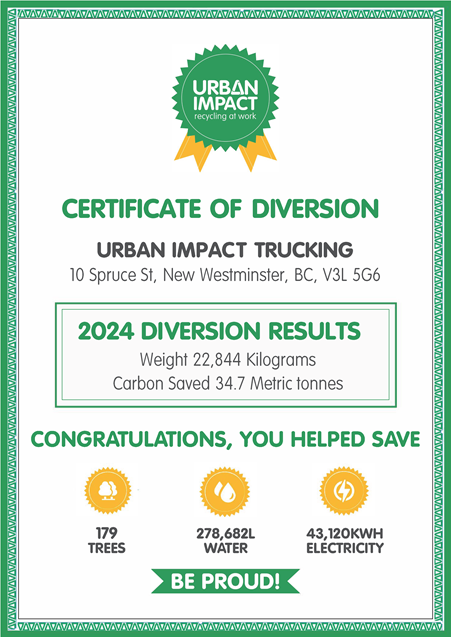
Certificate of Diversion
Reducing the waste that we generate is critical as local and regional landfill capacity is under pressure and waste generation per capita is not diminishing. Urban Impact created the Certificate of Diversion to salute our customers for being responsible and making an effort in waste diversion and recycling.
The Certificate of Diversion provides each customer with documented proof of their contribution in reducing their environmental impact.
Our customers have the satisfaction of knowing that their recycling efforts have made an impact!

Benefits of
Diverting Waste
Every tonne of material diverted from landfill through waste reduction, reuse, repurposing, and recycling reduces our carbon footprint and reduces the pressure on the regional waste system.
Did you know that every tonne of paper recycled can reduce your personal or business carbon footprint? Paper includes all office paper, paper that you generate at home, cardboard and shredded paper.
Other benefits include that for each material recycled, whether glass, paper, wood, or metal, fewer natural resources are required to manufacture future products. Recycling preserves our natural resources and ultimately conserves energy.
Urban Impact is proud that many of our customers post or publish their Certificate of Diversion in reception areas or other central locations for their staff to see.
Urban Impact would like to salute the efforts our customers make in diverting their waste from disposal and contributing positively.

FREQUENTLY ASKED QUESTIONS
We have collected a great deal of real-time bin weight data and used it to determine average bin weights. The weights used reflect the type of bin collected and the weight of an typically full bin. We have employed this approach since 2012.
Customers should note that the weight in kilograms includes multiple types of materials diverted (paper, cardboard, glass, metal, plastic, organics, etc). The calculation for trees saved, electricity reduced, and carbon saved equivalents considers only paper materials.
Non-paper materials also result in environmental savings — energy in particular – but are highly variable depending on the specific material in question and are therefore not converted into equivalents for Certificates of Diversion.
The weight diverted numbers include all traditional recyclables: all types of paper, fibre and cardboard, glass, metal, rigid plastic, soft plastic, and organics.
Certain materials are excluded: wood and construction waste; fluorescent light bulbs and tubes, as well as any materials
Urban Impact has collected using roll-off bins, compactors, bales, cages, or pallets, and any one-time shreds or recycling pick-ups. Unfortunately, the estimation methodology that we use cannot accurately account for these materials due to the sporadic and highly variable nature of these pick-ups and their weights.
There are several standard industry accepted calculations on the various environmental savings from recycling paper. Although there is some variation based on the type of paper recycled, the following figures offer a good general approximation that we use for Certificates (please note these numbers are sourced from the American EPA, so are in Imperial rather than Metric units – all numbers are converted to Metric for Certificates). Recycling one ton of paper saves approximately:
- 17 trees
- 2 barrels of oil
- 7,000 gallons of water
- 4,100 kilowatt hours of electricity
- 3.3 tons of carbon dioxide equivalents

